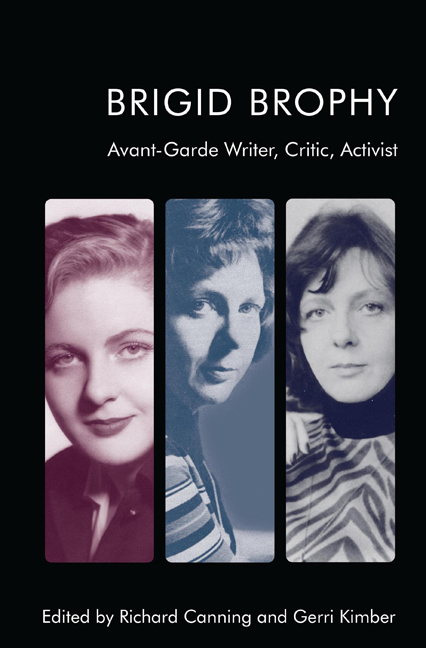Book contents
- Frontmatter
- Contents
- List of Illustrations
- Acknowledgements
- Introduction
- 1 Embodying the Fragments: A Refl ection on the Reluctant Auto-Biography of Brigid Brophy
- 2 Brigid Brophy’s Paradoxical World of Childhood
- 3 Intr oduction to ‘The Librarian and the Novel’
- 4 The Librarian and the Novel: A Writer’s View
- 5 Penetrating (the) Prancing Novelist
- 6 ‘Shavian that she was’
- 7 ‘Il faut que je vive’: Brigid Brophy and Animal Rights
- 8 Brigid Brophy’s Phenomenology of Sex in Flesh and The Snow Ball
- 9 Letter to Brigid
- 10 Encoding Love: Hidden Correspondence in the Fiction of Brigid Brophy and Iris Murdoch
- 11 ‘Heads and Boxes’: A Prop Art Exhibition Collaboration by Brigid Brophy and Maureen Duffy
- 12 Prancing Novelist and Black and White: Experiments in Biography
- 13 ‘Mo nster Cupid’: Brophy, Camp and The Snow Ball
- 14 ‘A Felicitous Day for Fish’
- 15 The Dissenting Feminist
- 16 A Certain Detachment?
- Notes on Contributors
- Index
4 - The Librarian and the Novel: A Writer’s View
Published online by Cambridge University Press: 17 October 2020
- Frontmatter
- Contents
- List of Illustrations
- Acknowledgements
- Introduction
- 1 Embodying the Fragments: A Refl ection on the Reluctant Auto-Biography of Brigid Brophy
- 2 Brigid Brophy’s Paradoxical World of Childhood
- 3 Intr oduction to ‘The Librarian and the Novel’
- 4 The Librarian and the Novel: A Writer’s View
- 5 Penetrating (the) Prancing Novelist
- 6 ‘Shavian that she was’
- 7 ‘Il faut que je vive’: Brigid Brophy and Animal Rights
- 8 Brigid Brophy’s Phenomenology of Sex in Flesh and The Snow Ball
- 9 Letter to Brigid
- 10 Encoding Love: Hidden Correspondence in the Fiction of Brigid Brophy and Iris Murdoch
- 11 ‘Heads and Boxes’: A Prop Art Exhibition Collaboration by Brigid Brophy and Maureen Duffy
- 12 Prancing Novelist and Black and White: Experiments in Biography
- 13 ‘Mo nster Cupid’: Brophy, Camp and The Snow Ball
- 14 ‘A Felicitous Day for Fish’
- 15 The Dissenting Feminist
- 16 A Certain Detachment?
- Notes on Contributors
- Index
Summary
A transcript of a talk given by Brigid Brophy at a day school organised by the Association of Assistant Librarians on 1 October 1980.
I read last summer in a magazine a review of a volume of stories by Patricia Highsmith. It's a volume (The Animal-Lover's Book of Beastly Murder) that I think an absolute marvel. So, as a matter of fact, did the review. Yet I finished reading it with a sense that I and the review were at cross purposes. It rounded off its many paragraphs of praise with a sentence it obviously thought to be the ultimate in laudation: ‘This’, it declared, ‘is the first fiction book I’ve read for years that isn't useless.’
On and off I’ve been wondering ever since what ‘use’ the reviewer found in that volume of fiction and had hoped but failed to find in other volumes of fiction. My own view is that fiction is immensely valuable but, precisely, useless – even when it's fiction by Patricia Highsmith. That is not to deny, of course, that fiction may have incidental and accidental consequences that are socially useful. As everyone here well knows, Britain has the largest public library service in the western world, and roughly 70 per cent of adult borrowing from public libraries is borrowing of fiction. In this country, therefore, fiction clearly has an admirable spin-off effect, in that it provides a livelihood for quite large numbers of public librarians. Alas, it is only in very few and very exceptional cases that it does as much for the writers of the fiction.
I fear, however, that neither librarians nor novelists can flatter themselves that theirs are among the obviously useful professions such as medicine or street-sweeping. Librarians may sometimes be able to make the claim about the 30 per cent of adult borrowing that concerns non-fiction, especially of course when the librarian acts as a computer dating service in bringing the borrower and the right non-fiction book together. If you direct a reader to the map he needs in his researches, you have done an intellectual equivalent of the kindness you do when you give a stranger directions in the street.
- Type
- Chapter
- Information
- Brigid BrophyAvant-Garde Writer, Critic, Activist, pp. 37 - 48Publisher: Edinburgh University PressPrint publication year: 2020



